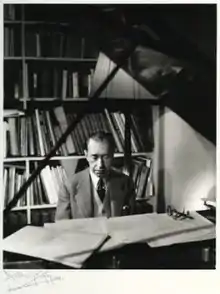Richard Addinsell | |
|---|---|
 Addinsell in 1949. | |
| Born | 13 January 1904 London, England |
| Died | 14 November 1977 (aged 73) London, England |
| Education | Hertford College, Oxford. Royal College of Music, Kensington, London. |
| Occupation | Composer |
Richard Stewart Addinsell (13 January 1904 – 14 November 1977)[1] was an English composer, best known for film music, primarily his Warsaw Concerto, composed for the 1941 film Dangerous Moonlight (also known under the later title Suicide Squadron).
Biography
Early life
Richard Addinsell was born in Woburn Square, London, to William Arthur Addinsell, who was a chartered accountant, and his wife, Annie Beatrice Richards.[2] The younger of two brothers, Addinsell was educated at home before attending Hertford College, Oxford, to study Law but went down after just 18 months. He then became interested in music.[3]
Early career
In 1925, he enrolled at the Royal College of Music but lasted only two terms before leaving, again without obtaining any formal qualification.[2] By this time Addinsell was already collaborating with Noel Gay, among others, in an André Charlot Revue.[3] More work for Charlot in 1927 was followed in 1928 by a collaboration with Clemence Dane on Adam's Opera at The Old Vic.[2] In 1929, he completed his informal education by touring Europe to visit major theatrical and musical centres such as Berlin and Vienna.[3]
In 1932, with Clemence Dane, he wrote the incidental music for the Broadway adaptation of the combined Alice in Wonderland and Through the Looking Glass by Eva Le Gallienne, starring Josephine Hutchinson (produced 1933).[4] In 1947 it was revived, starring Bambi Linn.
Career in film composition
The Warsaw Concerto was written for the 1941 film Dangerous Moonlight, and continues to be a popular concert and recording piece. The film-makers wanted something in the style of Sergei Rachmaninoff, but were unable to persuade Rachmaninoff himself to write a piece. Roy Douglas orchestrated the concerto. It has been recorded over one hundred times and has sold in excess of three million copies. Addinsell also scored Hitchcock's Under Capricorn (1949), referencing Irish folk melody in the score to support the Irish characters and their history.
Addinsell also wrote the short orchestral piece Southern Rhapsody, which was played every morning at the start of TV broadcasts by the former Southern Television company in the south of England from 1958 to 1981.
As was common with film music until the 1950s, many of Addinsell's scores were destroyed by the studios as it was assumed there would be no further interest in them. However, recordings of his film music have been issued since his death, often reconstructed by musicologist and composer Philip Lane from the soundtracks of the films themselves and conducted by Kenneth Alwyn[5][6][7] or Rumon Gamba.[3]
Later career
He collaborated from 1942 with Joyce Grenfell for her West End revues (including Tuppence Coloured and Penny Plain) and her one-woman shows. He also wrote for West End musical revues directed by Laurier Lister, including Airs on a Shoestring Addinsell's music is in the "English light music" style.[8] He regularly composed at the piano, providing other creative musicians such as Roy Douglas, Leonard Isaacs or Douglas Gamley with broad indications for their full orchestrations.[3] Orchestral works composed (or adapted) for the concert hall include The Invitation Waltz (1950), the Smokey Mountains Concerto (1950) and The Isle of Apples (1965).[4]
Personal life
Addinsell retired from public life in the 1960s, gradually becoming estranged from his close friends. He was, for many years, the companion of the fashion designer Victor Stiebel, who died in 1976.
Addinsell died in Brighton in 1977 aged 73. His cremation took place at Golders Green Crematorium on 18 November 1977.[9] His ashes are buried there in a communal section of the crocus lawn.[9]
Film credits
|
|
- Note: The source for the television and film appearances is the British Film Institute.[10]
References
- ↑ Randel, Don Michael, ed. (1996). "Addinsell, Richard (Stewart)". The Harvard biographical dictionary of music. Cambridge, Massachusetts: Belknap Press of Harvard Univ. Press. pp. 5. ISBN 0-674-37299-9.
- 1 2 3 Lamb, Andrew (2004). 'Addinsell, Richard Stewart (1904–1977)'. Oxford Dictionary of National Biography, Oxford University Press. Retrieved 13 September 2011.(subscription required)
- 1 2 3 4 5 Lane, Philip (2003). 'The film music of Richard Addinsell' (pdf). Chandos Records. Retrieved 12 September 2011.
- 1 2 Ades, David. 'Addinsell, Richard (Stewart)' in Grove Music Online (2001)
- ↑ Lane, Philip (1999). 'Richard Addinsell: film music'. ASV Records [sleevenotes to CD reviewed by Lace, Ian (1999) on MusicWeb International. Retrieved 12 September 2011.
- ↑ 'Richard Addinsell: Goodbye Mr Chips / A Tale of Two Cities', recording released on Marco Polo Records (1994). Retrieved 12 September 2011.
- ↑ 'Music of Richard Addinsell including Warsaw Concerto'. ASV Records [CD reviewed by Seeley, Robert (1997) in Gramophone, September 1997, pp 121–122. Retrieved 13 September 2011.
- ↑ Lamb, Andrew (2002). 'British light music: sound good, feel good', Gramophone November 2002, pp.34–38. Retrieved 13 September 2011.
- 1 2 >Wilson, Scott. Resting Places: The Burial Sites of More Than 14,000 Famous Persons, 3d ed.: 2 (Kindle Locations 508-509). McFarland & Company, Inc., Publishers. Kindle Edition.
- ↑ "Addinsell, Richard", British Film Institute, accessed 11 February 2012